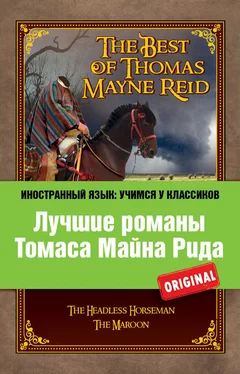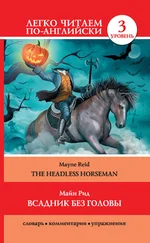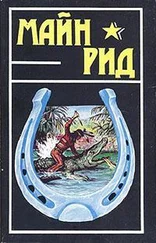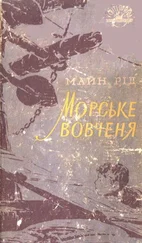The hour of action drew nigh. The sun went down over the opposite ridge, where lay Montagu Castle, his own domain. The twilight, like a purple curtain, was gently drawn over the valley of Mount Welcome. It was time to start.
Smythje rose to his feet; and, after making a reconnoissance of the ground before him, set off in the direction of the house.
He aimed at keeping as much as possible under cover of the woods; and this he was enabled to do – the pimento groves on that side stretching down to the shrubbery that surrounded the dwelling.
He had got past the negro village – keeping it upon his right – without being observed. To both the “quarter” and the sugar works he gave as wide a berth as the nature of the ground would permit.
He succeeded in reaching the platform on which the house stood – so far unperceived.
But the moment of peril was not yet past. The dangerous ground still lay before him, and had still to be traversed. This was the open parterre in front of the house: for it was to the front that the path had conducted him.
It was dusk; and no one appeared – at least he could see no one – either on the stair-landing or in the windows of the great hall. So far good.
A rush for the open doorway, and then on to his own chamber, where Thoms would soon clothe him in a more becoming costume.
He started to make the rush, and had succeeded in getting half-way across the parterre , when, all at once, a crowd of people, carrying large flaming torches above their heads, appeared, coming from the rear of the dwelling.
They were the domestics and some field hands of the plantation, with Trusty, the overseer, at their head.
One might have fancied that they were setting out upon some ceremonious procession; but their hurried advance, and the presence of Quashie trotting in the lead, proclaimed a different purpose.
Smythje divined their errand. They were going in search of himself!
The sight filled him with despair. The torch-bearers had anticipated him. They had already reached the front of the house, and the glare of their great flambeaux illuminated every object, as if a new sun had suddenly shot up athwart the sky!
There was no chance of successfully running the gauntlet under that bright flame: Smythje saw not the slightest.
He stopped in his tracks. He would have retreated back among the bushes, and there awaited the departure of the torch-bearers, but he feared that his retrograde movement would attract their eyes upon him; and then all would be over – his adventure terminating in the most undesirable manner.
Instead of retreating, therefore, he stood where he had stopped – fixed and immobile, as if pinned to the spot.
At that moment two figures appeared on the top of the stairway – in the brilliant light easily recognisable as the planter and his daughter. The maid Yola was behind them. Mr Vaughan had come out to give some directions about the search.
All three stood facing the crowd of torch-bearers, and, of course, fronting towards Smythje.
The planter was just opening his lips to speak, when a cry from the maid, echoed by her young mistress, interrupted him. The sharp eyes of the Foolah had fallen upon Smythje, whose wan, white face, shining under the light of the links, resembled those of the statues that were set over the parterre .
Smythje was among the shrubbery; and as the girl knew that no statue stood there, the unexpected apparition had elicited her cry of alarm.
All eyes were instantly turned upon the spot, while the torch-bearers, with Trusty at their head, hurried towards it.
There was no chance of escape. The unfortunate sportsman was discovered and brought broadly into the light, under the fierce battery of eyes – among others, the eyes of his lady-love, that, instead of expressing sympathy for his forlorn condition, appeared rather to sparkle with satirical delight!
It was a terrible catastrophe – to be contemplated in such a plight; and Smythje, hurrying through the crowd, lost no time in withdrawing from observation by betaking himself to his chamber; where, under the consolatory encouragement of the sympathising Thoms, he was soon rendered presentable.
Chapter 9
Herbert in the Happy Valley
Inappropriate as Jacob Jessuron’s neighbours may have deemed the title of his estate – the Happy Valley – Herbert Vaughan had no reason to regard it as a misnomer. From the hour in which he entered upon his situation of book-keeper, it was a round of pleasures, rather than duties, that he found himself called upon to fulfil; and his new life, so far from being laboriously spent, was one continued scene, or series of scenes, of positive pastime.
Instead of keeping books, or looking after slaves – or, in short, doing anything that might be deemed useful – most of his time was spent in excursions, that had no other object than recreation or amusement. Drives to the Bay – in which he was accompanied by Jessuron himself, and introduced to his mercantile acquaintances; visits to neighbouring penns and plantations with the beautiful Judith – in which he was made acquainted with her circle; fishing parties upon the water, and picnics in the woods: all these were afforded him without stint.
He was furnished with a fine horse to ride; dogs and equipments for the chase; everything, in short, calculated to afford him the life of a gentleman of elegant leisure. A half-year’s salary had been advanced to him unasked – thus delicately giving him the means of replenishing his wardrobe, and enabling him to appear in proper costume for every occasion.
Certainly, the prospects of the poor steerage-passenger seemed to have undergone a change for the better. Through the generosity of his unexpected patron, he was playing a rôle at the Jew’s penn not unlike that which his fellow-voyager was, at that very time, performing at Mount Welcome; and as there was not much difference in the social rank of the respective circles in which they were each revolving, it was by no means improbable that the two might meet again, and upon a more equal footing than formerly.
To do Herbert Vaughan justice, it should be stated that he was more surprised than gratified by the luxurious life he was leading. There was something rather extraordinary in the generous patronage of the Jew – something that puzzled him not a little. How was he to account for such kind hospitality?
Thus for days after Herbert Vaughan had made the Happy Valley his home, matters moved on smoothly enough to the superficial observer. Slight incongruities that did occur from time to time, were ingeniously explained; and the young Englishman, unsuspicious of any evil design, with the exception of the unwonted hospitality that was being bestowed upon himself, saw nothing extraordinary in the circumstances that surrounded him.
Had he been less the honoured guest of his Israelitish host, perhaps his perceptions might have been more scrupulous and discriminative. But the Arabs have a proverb – “It is not in human nature to speak ill of the horse that has borne one out of danger;” and human nature in the East is but the counterpart of its homonym in the West. Noble as was the nature of the young Englishman, still was it human; and to have “spoken ill of the bridge that had carried him safely over” – and from that desolate shore on which he had late been stranded – would have argued a nature something more than human.
If he entertained any suspicion of his patron’s integrity, he zealously kept it to himself – not with any idea of surrendering either his independence or self-respect; but to await the development of the somewhat inexplicable courtesy of which he was the recipient.
This courtesy was not confined to his Hebrew host. As Herbert had long been aware, his daughter exercised it in an equal degree, and far more gracefully. Indeed, among other transformations that had been remarked as occurring in the Happy Valley, the spirit of the fair Jewess seemed also to have sustained a remarkable change. Though upon occasions the proud, imperious temper would manifest itself, more generally now was Judith in a sentimental vein – at times approaching to sadness. There were other times when the old spitefulness would show itself. Then the spiral nostrils would curl with contempt, and the dark Israelitish eyes flash with malignant fire.
Читать дальше
Конец ознакомительного отрывка
Купить книгу











